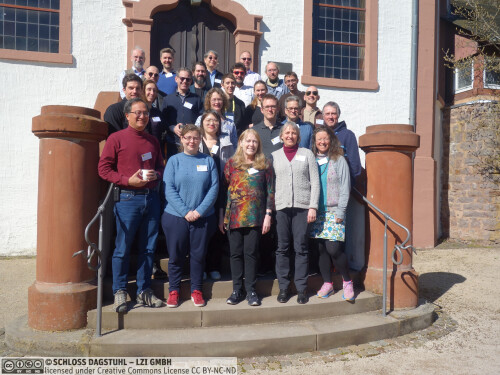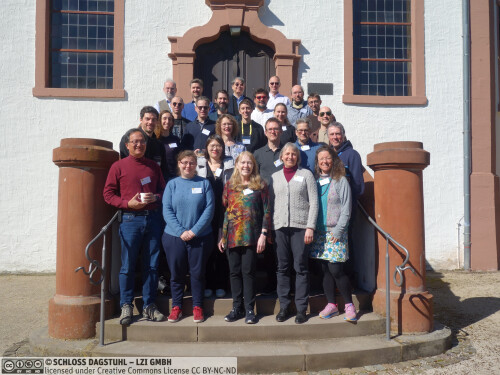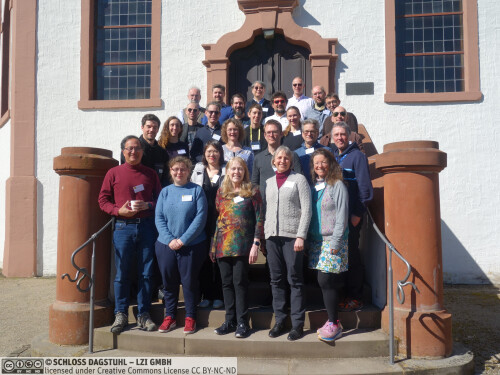Dagstuhl Perspectives Workshop 25122
Climate Change: What is Computing’s Responsibility?
( Mar 16 – Mar 19, 2025 )
Permalink
Organizers
- Vicki Hanson (ACM - New York, US)
- Bran Knowles (Lancaster University, GB)
Contact
- Marsha Kleinbauer (for scientific matters)
- Christina Schwarz (for administrative matters)
Shared Documents
- Dagstuhl Materials Page (Use personal credentials as created in DOOR to log in)
Schedule
This Dagstuhl Perspectives Workshop is enthusiastically supported by the Association for Computing Machinery (ACM), which provides independent, nonpartisan, and technology-neutral research and resources to policy leaders, stakeholders, and the public about public policy issues, drawn from the deep technical expertise of the computing community. Emerging consensus from participants will be used to inform ACM’s efforts in a way that is consistent with the imperative to address the climate crisis. ACM will cover travel and lodging costs.
The Dagstuhl Perspectives Workshop 25122, held 16--19 March 2025, convened global experts from computing, environmental science, and policy to address computing's role and responsibility in the climate crisis. Participants discussed the environmental impacts of computing technologies alongside vaunted possibilities for climate mitigation and adaptation. Through these discussions, participants converged on a shared vision of the responsibility of computing professionals within the present reality of climate crisis. This vision was articulated in a Manifesto outlining core recognitions and commitments.
Key Themes and Insights
Computing’s Role in Climate Change:
- Computing technologies have a growing negative impact on the environment; these impacts deserve more serious consideration at all levels.
- While there are positive environmental use cases for computing, rhetoric on the potential of computing to mitigate climate change is unsubstantiated and likely overly optimistic.
- Computing technologies tend to amplify and accelerate; so in a society on a path towards exceeding climate targets, computing technologies are likely getting us there faster.
- Responsibility and Ethics:
- Discussions emphasised the need for computing professionals to embrace a broader ethical responsibility that includes not only minimising harm but also prioritising sustainability and promoting systemic change.
- Responsible computing must at the same time promote a socially just transition to a sustainable future
- Measurement and Accountability:
- Participant experts highlighted the methodological challenges in assessing computing’s environmental footprint, including direct and indirect impacts (e.g. rebound effects).
- Calls were made for stronger professional standards, improved methodologies for assessing impacts, and greater transparency.
- Additional leverage points:
- Participants discussed the global technology policy landscape and the need for computing professionals to actively influence regulation.
- Promoting a paradigm shift will require a revolution in computing education.
- Producing a Manifesto:
- The workshop culminated in the co-development of a Manifesto outlining shared commitments and principles for sustainable computing.
- The Manifesto is intended to serve as both a guiding document for practitioners and a tool for influencing policy, advocating for transparency, repairable and reusable technologies, and prioritising the public good over profit.
Conclusions
The workshop underscored that computing is at a crossroads: it can continue contributing to the climate crisis or become a powerful agent of change. Achieving the latter requires a collective shift in values, rigorous evaluation of impacts, systemic policy engagement, and a strong ethical framework guiding innovation.
Acknowledgements
This workshop was initiated and partly funded by the ACM Europe Council [1], which promotes dialogue and the exchange of ideas on technology and computing policy issues with the European Commission and other governmental bodies in Europe.
References
- Acm europe council, 2025.
 Vicki Hanson and Bran Knowles
Vicki Hanson and Bran Knowles
This Dagstuhl Perspectives Workshop aims to provide a forum for world-leading computer scientists and expert consultants on environmental policy and sustainable transition to engage in a critical and urgent conversation about computing’s responsibilities in addressing climate change. The workshop will consider the positive and negative climate impacts of a range branches of computing, including (but not limited to): AI and Machine Learning; Software and Mechanical Engineering; Internet Architectures; Large-scale, Distributed, and Cloud-based systems; Environmental Data Science and Climate Modelling; ICT Environmental Assessment and Energy-Aware Computing; Smart Cities, Smart Grid, and Transition Engineering; Safety and Security; and Human-Computer Interaction and ICT for Sustainability.
Day 1: Tracking and reducing computing’s emissions. Attendees will deliberate on the scale of carbon reductions needed within the Information and Communications Technologies (ICT) sector, discuss technical advancements that can be deployed to rapidly reduce emissions, and consider how to develop and manage climate change compliance processes in the face of methodological challenges in measuring ICT emissions.
Day 2: Maximizing the net positive impact of computing. Discussion will focus on the ways computing can be applied to mitigate and adapt to the climate crisis, including the harnessing of digital solutions to enable emissions reductions across the wider economy, and how the societal benefits of computing (e.g. enabling of other Sustainable Development Goals) can be maximized while seriously constraining carbon emissions.
Day 3: Creating a manifesto. Each year at the United Nations Climate Change Conference (commonly known as COP) countries pledge nationally determined contributions in the fight against climate change; at this workshop we will answer the question, “What is computing’s pledge?” Together, we will produce a Dagstuhl Manifesto that outlines a strategic plan for computing to materially contribute to the meeting of climate targets and specifies mechanisms for tracking and incentivizing progress.
 Vicki Hanson and Bran Knowles
Vicki Hanson and Bran Knowles
Please log in to DOOR to see more details.
- Christoph Becker (University of Toronto, CA) [dblp]
- Andrew A. Chien (University of Chicago, US) [dblp]
- Benoit Combemale (University of Rennes, FR) [dblp]
- Vlad Coroama (Roegen Centre for Sustainability - Zürich, CH) [dblp]
- Koen De Bosschere (Ghent University, BE) [dblp]
- Yi Ding (Purdue University - West Lafayette, US)
- Adrian Friday (Lancaster University, GB) [dblp]
- Boris Gamazaychikov (Salesforce - Paris, FR)
- Vicki Hanson (ACM - New York, US) [dblp]
- Lynda Hardman (CWI - Amsterdam, NL & Utrecht University, NL) [dblp]
- Simon Hinterholzer (Borderstep Institute - Berlin, DE) [dblp]
- Mattias Höjer (KTH Royal Institute of Technology - Stockholm, SE) [dblp]
- Lynn Kaack (Hertie School of Governance - Berlin, DE) [dblp]
- Lenneke Kuijer (TU Eindhoven, NL) [dblp]
- Anne-Laure Ligozat (CNRS - Orsay, FR) [dblp]
- Jan Tobias Muehlberg (Free University of Brussels, BE) [dblp]
- Yunmook Nah (Dankook University - Yongin-si, KR) [dblp]
- Thomas Olsson (University of Tampere, FI) [dblp]
- Anne-Cécile Orgerie (CNRS - IRISA - Rennes, FR) [dblp]
- Daniel Pargman (KTH Royal Institute of Technology - Stockholm, SE) [dblp]
- Birgit Penzenstadler (Chalmers University of Technology - Göteborg, SE) [dblp]
- Chris Preist (University of Bristol, GB) [dblp]
- Tom Romanoff (ACM - New York, US)
- Emma Strubell (Carnegie Mellon University - Pittsburgh, US) [dblp]
- Colin Venters (University of Limerick, IE) [dblp]
- Junhua Zhao (The Chinese University of Hong Kong - Shenzhen, CN)
Classification
- Artificial Intelligence
- Human-Computer Interaction
- Software Engineering
Keywords
- sustainability
- climate change
- efficiency
- supply chain management
- climate modelling





 Creative Commons BY 4.0
Creative Commons BY 4.0
